Workshops
Workshop on “Identification and side determination of long bones”
Date: 06 November 2025
The Department of Forensic Science, School of Biological and Forensic Sciences in collaboration with College of Dental Sciences, Davangere, conducted a workshop on “Identification and Side Determination of Long Bones” on 6th November 2025 for III Semester MSc Forensic Science students specializing in Biology and Chemistry. The session was facilitated by Dr. Deepak V, Program Coordinator, Department of Forensic Dentistry, and Associate Professor, Department of Oral and Maxillofacial Pathology and Microbiology, College of Dental Sciences, Davangere. The workshop aimed to provide students with hands-on training in identifying long bones, determining their side, and estimating sex and determining age based on skeletal characteristics. With nearly 40 real skeletal specimens, the session offered an invaluable practical experience that bridged theoretical learning with real-world forensic applications. 19 students of Biology and Chemistry specialization of final year MSc Forensic Science students actively participated, examining craniofacial and long bone features under expert guidance. The event enriched their understanding of forensic anthropology and strengthened interdisciplinary collaboration between the College of Dental Sciences, Davangere, and the Department of Forensic Science.
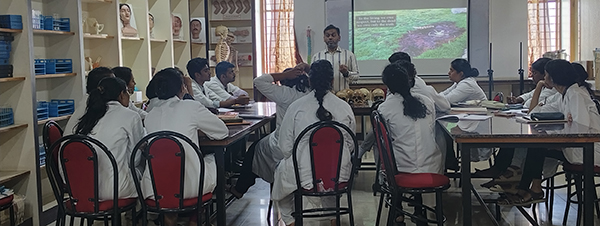
Workshop on Forensic Photography
Date: 05 November 2025
On November 5th,2025, the School of Biological and Forensic Science, Department of Forensic Science organised a workshop on Forensic Photography for the first-year B.Sc. Forensic Science students at the M2 Auditorium, Kristu Jayanti Deemed-to-be University. The session was conducted by Mr. Aby Augustine, Head of the Department of Media Studies, who provided valuable insights into the technical and artistic aspects of forensic photography. The workshop emphasized the importance of photographic documentation in crime scene investigation and evidence analysis. A total of 105 students attended the session, gaining knowledge on camera handling, framing, lighting, and image composition relevant to forensic applications.
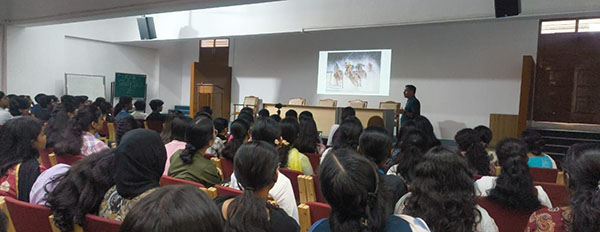
Workshop on Interview Skills for MSc Forensic Science Students
Date: 11 September 2025
The Department of Forensic Science, in collaboration with the Centre for Employability and Corporate Relations (CECR), organised a soft skills training session titled “Gate 2026 Opening a Passage - Soft Skills Training on Interview Skills” on September 11, 2025, at the Council Room, First Floor, Admin Block, Kristu Jayanti (Deemed to be) University.
The session was facilitated by Prof. Sen B. Mathew, who emphasized the importance of effective communication, confidence building, and professional etiquette in cracking interviews. The training introduced students to strategies for self-presentation, handling technical and HR questions, and overcoming common challenges faced during interviews.
The highly interactive session included mock interview exercises, practical demonstrations, and personalized feedback, enabling students to identify their strengths and areas for improvement. The facilitator also highlighted key aspects of body language, time management, and preparation techniques tailored for competitive job markets and higher academic opportunities.
The session concluded with a Q&A segment, where students actively engaged with the resource person, gaining clarity on industry expectations and career pathways. The programme left the participants motivated and better equipped to face upcoming interviews with confidence and professionalism
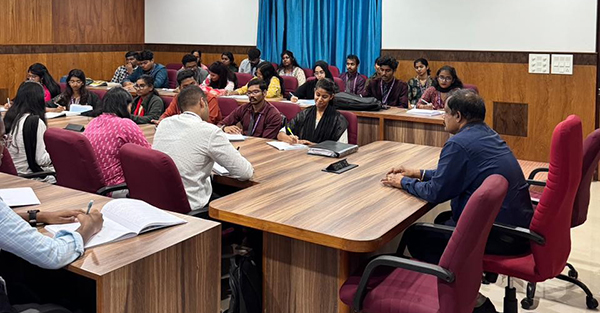
Workshop on Statistics in Research
Date: 19 September 2025
The Department of Forensic Science, School of Biological and Forensic Sciences, Kristu Jayanti (Deemed to be University), organised a workshop on “Statistics in Research” for M.Sc. Forensic Science I and II year students on 19th September 2025 at the M4 Auditorium, Science Block.
The session was conducted by Dr. Unnikrishnan T S, Assistant Professor, Department of Social Work, who served as the resource person. The workshop provided valuable insights into the application of statistics in scientific research. Dr. Unnikrishnan covered key concepts such as measures of central tendency, hypothesis testing, and their relevance in research analysis, enabling students to understand how statistical tools aid in drawing meaningful conclusions from data.
The session was highly interactive and practical, equipping students with essential analytical skills for their academic research and future professional endeavours.
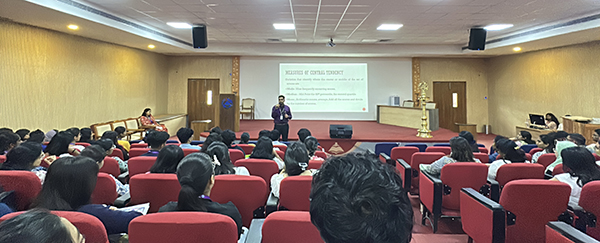
Workshop on Statistical Tools in Research
Date: 01 March 2025
The Department of Forensic Science at Kristu Jayanti College successfully conducted a workshop on " Workshop on Statistical Tools in Research " on 1st March 2025. Led by Mr. Mebin Wilson Thomas, Assistant Professor at JAIN (Deemed-to-be University), Bangalore, the session provided M.Sc. Forensic Science students with hands-on training in Jamovi, a powerful statistical tool. The workshop was divided into three segments: Introduction to Jamovi, Coding in Jamovi, and Data Analysis using Jamovi, covering essential statistical techniques such as hypothesis testing and regression analysis. The interactive session enabled students to bridge the gap between theoretical knowledge and real-world forensic data analysis. The event was well-received, equipping 70 participants with practical skills to enhance their research methodologies.
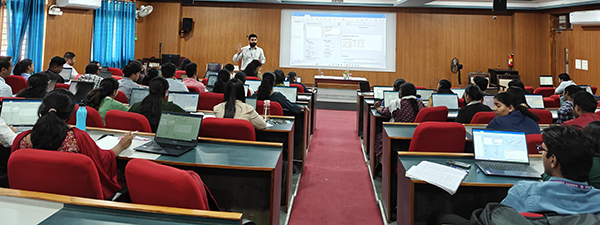
Workshop on Geographic Information System (GIS)
Date: 31 January 2025
The Department of Forensic Science and Department of Life Science, in collaboration with Avakaza Geoscience Research Technologies, Bangalore, successfully conducted a workshop on "Geographic Information System" on January 31, 2025, at the H1 Auditorium, Humanities Block, Kristu Jayanti College.
The session introduced students to the significance of GIS in forensic investigations and life sciences, covering crime mapping, suspect tracking, accident analysis, and forensic taphonomy. Experts from Avakaza Geoscience Research Technologies demonstrated real-world applications of geospatial data, hotspot analysis, and predictive policing in criminal investigations.
The interactive session included forensic case studies, discussions on spatial technology in forensic science, and insights into career opportunities in geospatial forensics and digital crime analysis. The workshop concluded with an engaging Q&A session, where industry experts addressed queries, leaving students inspired to explore GIS-driven forensic research and investigations.
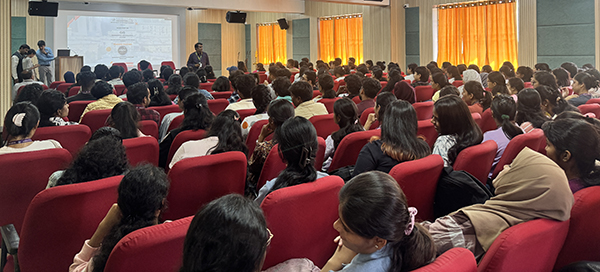
Workshop on Virtual Autopsy
Date: 12 November 2024
On November 12, 2024, the Department of Forensic Science at Kristu Jayanti College (Autonomous), Bengaluru, held a half-day workshop on "Virtual Autopsy." The event, aimed at introducing students to this advanced forensic tool, consisted of three engaging sessions from 10:00 AM to 1:00 PM.
The first session was led by Dr. Hemanth Naik, Chief Medical Officer of Virtual Autopsy Solutions in the UK and India. Dr. Naik provided a comprehensive overview of virtual autopsy, discussing its principles, applications, and the advantages it offers to modern forensic investigations. The second session was conducted by Mr. Mayank Raiborde, Assistant Professor at Kristu Jayanti College, who focused on the relevance of virtual autopsy in India. He presented practical applications and case studies, enriching the students' understanding of this technique in an Indian context. The final segment featured a report from Ms. Riya Ghosh, a fifth-semester Forensic Science student, who shared her reflections on virtual autopsy and summarized key insights from the project.
This workshop offered students a valuable blend of theoretical knowledge and practical perspectives, significantly enhancing their understanding of virtual autopsy’s role in forensic science.
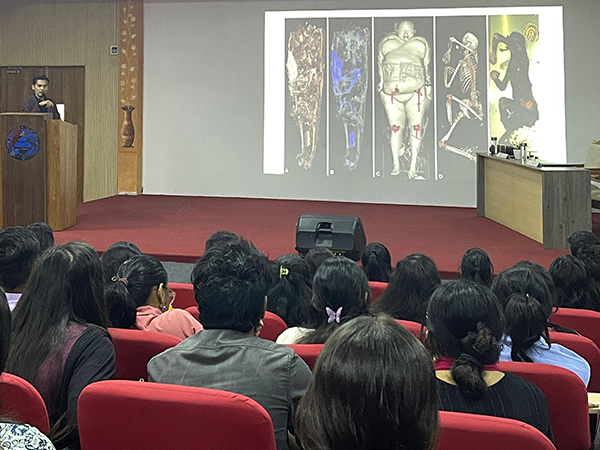
Workshop on “Blood Stain Pattern Analysis”
Date: 15 September 2024
On September 15, 2024, the Department of Forensic Science at Kristu Jayanti College (Autonomous), Bengaluru, organized a one-day workshop on "Blood Stain Pattern Analysis" for MSc. Forensic Science students. Led by Mr. Krushna Sonawane, Head of the Department and Assistant Professor at GTN Arts College, Dindigul, the workshop attracted 72 enthusiastic participants. The morning session, held from 10:00 AM to 1:30 PM, focused on the theoretical foundations, principles, and concepts of bloodstain pattern analysis. Students engaged deeply with the subject matter, gaining insights into the intricacies of blood evidence interpretation. In the afternoon, from 2:00 PM to 4:30 PM, attendees participated in hands-on training, applying their theoretical knowledge in practical scenarios. This interactive approach not only enhanced their understanding but also equipped them with essential skills for their future careers in forensic science. The workshop fostered an engaging learning environment, making it a significant event in the academic calendar.
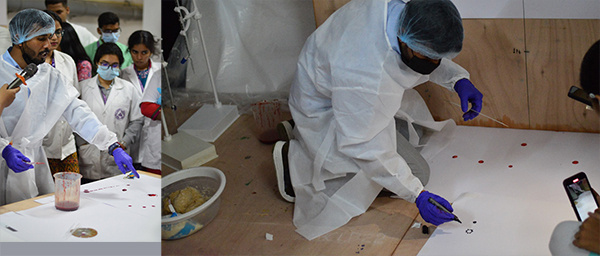
Workshop on Intellectual Property Rights
Date: 03 May 2024
In commemoration of World IPR Day, the Department of Forensic Science organized a Workshop on Intellectual Property Rights on 3/05/2024. The offline workshop raised awareness about IPRs and Patent Filing. The keynote speaker, Mr. Sanath MV, founder of Prasa IP, Bengaluru, discussed intellectual property, patent filing, and related clauses. He explained the differences and legal implications of patents, trademarks, copyrights, and trade secrets. The workshop covered legal and administrative aspects of patent filing, addressing educator concerns and misconceptions. Mr. Sanath MV discussed patent counsel, prior art searches, and patent specification writing. He also explained that in addition to protection, patents in education can generate cash through licensing agreements, attract financing for research and development, and boost educational institutions' reputation and marketability.
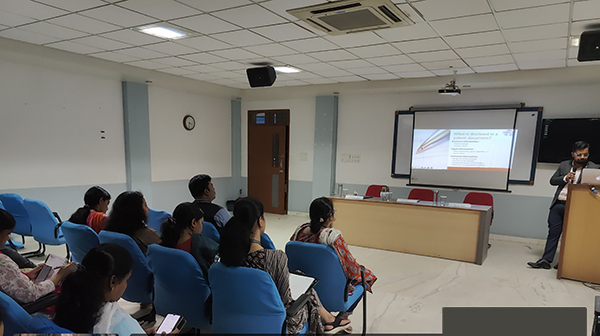
Workshop on Detection of Deception
Date: 17 April 2024
Dive into the captivating exploration of deception detection as Sunny Joseph, a renowned Consultant Clinical Psychologist & Neuropsychologist, led an illuminating workshop on April 17, 2024 for IV semester BSc Forensic science students and VI semester BA Psychology students . This engaging event was designed to unravel the intricacies of human behavior and empower participants with invaluable insights into discerning truth from falsehood. The workshop served as a dynamic platform for learning and growth, fostering a rich exchange of ideas and experiences among participants. Mr. Sunny Joseph's expertise and engaging teaching style captivated audiences, providing them with practical tools and strategies to navigate the complexities of deceit in various contexts. From understanding subtle behavioral cues to interpreting verbal and nonverbal communication, attendees gained a comprehensive understanding of the mechanisms underlying deception detection.
As the workshop concluded, participants departed with a heightened sense of awareness and confidence in their ability to discern truth from deception—an invaluable skill set applicable in both personal and professional spheres.
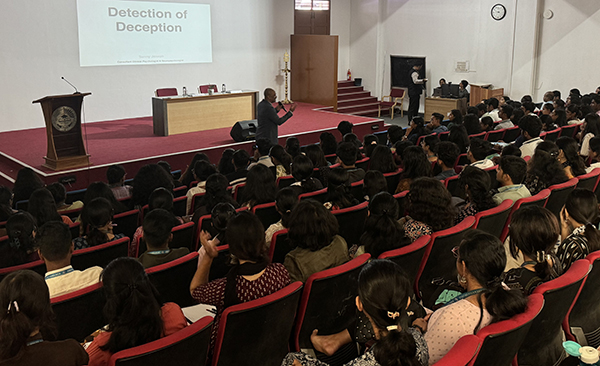
Mobile Forensic Workshop
Date: 24 February 2024
The Mobile Forensics Workshop, organized by the Department of Forensic Science at Kristu Jayanti College (Autonomous), aimed to provide participants with comprehensive insights into various aspects of mobile device forensics. The workshop consisted of two sessions, each focusing on different topics within the field. Session I, conducted by Mr. Senthil Kumar, COO of Proaxis Solutions, delved into the scope and acquisition of Android and iOS devices, along with social media forensics. Attendees gained understanding of Android and iOS system architecture, file systems, acquisition methods, and the importance of mobile forensic acquisition steps. Mr. Kumar also showcased a WhatsApp data extraction tool developed by Proaxis Solutions, enhancing participants' practical knowledge.
In Session II, Ms. Harini Girish, CEO of Proaxis Solutions, led a practical session on mobile device acquisition using tools such as Mobil Edit, Cellbrite UFED, and Magnet Acquire. Through hands-on experiences and case scenarios, participants learned about the significance of mobile device acquisition in forensic investigations. Ms. Girish also provided insights into call detail record (CDR) analysis and visualization tools, emphasizing their role in gathering crucial case-related information.
The workshop concluded with attendees expressing great interest and enthusiasm, thanks to the extensive experience and expertise of the resource persons. Participants appreciated the practical demonstrations, case studies, and valuable insights shared during the sessions. The workshop provided a platform for students to broaden their perspectives and explore potential career opportunities in the field of mobile forensics.
Overall, the Mobile Forensics Workshop was deemed highly informative and valuable, contributing to the professional development of the participants and fostering a deeper understanding of mobile device forensics. We extend our gratitude to the Department of Forensic Science at Kristu Jayanti College for organizing such an enlightening event and providing ongoing support to students' learning endeavors.
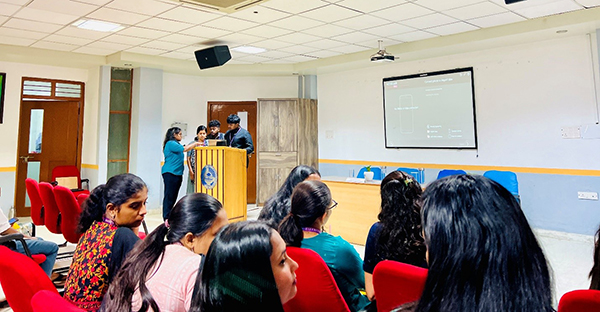
Workshop on Disaster Victim Identification
Date: 03 February 2024
Disaster Victim Identification (DVI) is the process of identifying individuals who have died as a result of a mass casualty incident or disaster. This process is crucial for various reasons, including providing closure to the families of the deceased, facilitating legal proceedings, and aiding in the management of disaster response efforts. DVI typically involves a multidisciplinary approach, drawing upon expertise from forensic science, forensic dentistry, anthropology, pathology, DNA analysis, and other relevant fields.
One-day post conference workshop on Disaster Victim Identification (DVI), organized by the department of forensic science turned out to be a very beneficial and eye-opening session for the participants of the International Conference on Advances in Forensic Science (ICAFS’24) organized by the department and as well as for the PG students. The speaker for the workshop was Dr. Deepak V, C. Director, Department of Forensic Dentistry and Faculty, Department of Oral & Maxillofacial Pathology and Microbiology, Coordinator, Internal Quality Assurance Cell, at M R Ambedkar Dental College & Hospital Bengaluru, Karnataka, India.
A total of 17 external participants witnessed and received a very insightful session on the proposed topic as well as had a great experience on the outdoor hands-on practical session on the same topic. A small demonstration of FTIR/ATR situated at the Forensic Science Research unit of the department was also conducted for the external participants by Dr. Suchita Rawat, Assistant Professor and Research coordinator of the department at the end of the workshop.
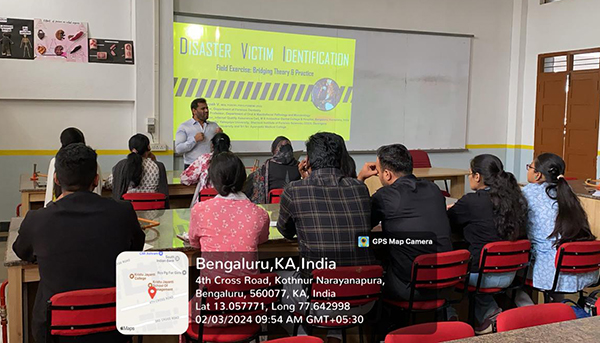
Online workshop on "Artificial Intelligence in Research"
Date: 06 January 2024
The Department of Forensic Science successfully organized an online workshop on "Artificial Intelligence in Research" on January 6, 2024, via the Zoom platform. The workshop, designed to explore the applications of artificial intelligence tools in research with a focus on scientific writing and publishing, featured Dr. K.S. Sowmiya, an esteemed editor at Editage and the founder of Sowmis_AWW, as the resource person. The workshop aimed to provide valuable insights into leveraging artificial intelligence tools to enhance research practices, particularly in scientific writing and publishing. The speaker gave brief explanation of the introduction to artificial Intelligence in Research, further she provided exhaustively covered list of AI tools for improving the quality and efficiency of research writing. The workshop provided a dynamic learning environment, offering participants a unique opportunity to interact with a leading expert in the field. Attendees were encouraged to apply the knowledge gained in their respective research endeavours.
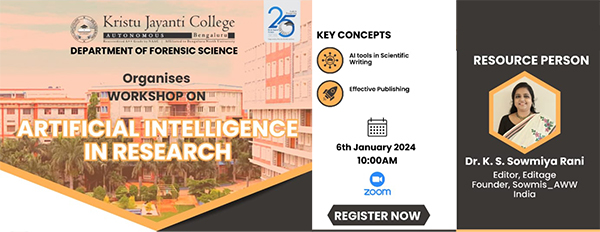
FTIR Fourier Transform Infrared Spectroscopy
Date: 05 January 2024
An educational workshop titled "FTIR Fourier Transform Infrared Spectroscopy" was held at the M1 Auditorium for M.Sc. Forensic Science students and Lifesciences enthusiasts. Dr. Devendiran, a seasoned expert from PerkinElmer (India) Pvt. Ltd., Chennai, led the session, providing in-depth insights into FTIR spectroscopy's principles, applications, and advancements. The workshop covered fundamental concepts, instrumentation overview, and real-world applications in Forensic Science and Life Sciences, followed by practical demonstrations. Participants gained academic enrichment and networking opportunities in the scientific community.
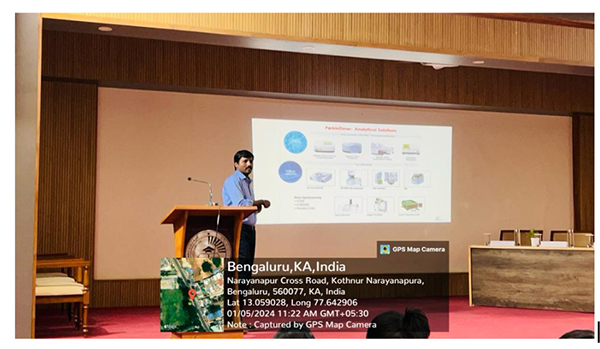
Outcome Based Education Workshop
Date: 04 December 2023
On December 04, 2023, the Department of Forensic Science at Kristu Jayanti College hosted a comprehensive Outcome-Based Education (OBE) workshop for its esteemed faculty members. This workshop aimed to equip educators with the knowledge and tools necessary to implement outcome-focused approaches in their teaching methodologies, aligning with contemporary educational paradigms and industry requirements. The workshop began with an in-depth exploration of the principles and philosophy behind Outcome-Based Education. Faculty members gained insights into the shift from traditional teaching methods to a learner-centric model that emphasizes clearly defined learning outcomes, competencies, and assessments. Participants actively engaged in sessions focusing on curriculum mapping and design aligned with OBE principles. The workshop delved into the process of identifying and articulating program-level learning outcomes, ensuring that the curriculum was strategically designed to meet these predefined objectives. The workshop incorporated interactive sessions and group activities to facilitate a collaborative learning environment. Participants actively engaged in discussions, shared best practices, and collaborated on developing sample learning outcomes and assessments tailored to their courses.
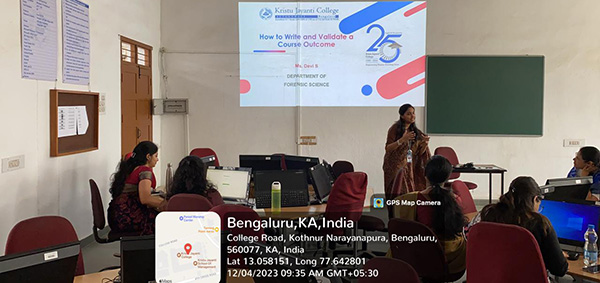
one-day workshop on FTIR/ATR Handling and Working for the teaching staff
Date: 20 July 2023
On 20th of July, 2023, the Department of Forensic Science at Kristu Jayanti College (Autonomous), Bengaluru, organized a one-day workshop on FTIR/ATR Handling and Working for the teaching staff from the Departments of Life Sciences and Physical Sciences. The objective of the workshop was to familiarize the participants with the principles, techniques, and applications of Fourier Transform Infrared Spectroscopy (FTIR) with Attenuated Total Reflection (ATR) in various scientific fields. The workshop commenced with a warm welcome of all the HODs, Coordinators and faculty members of the mentioned Departments by Mr. Don Caeiro, Coordinator, Dept. of Forensic science, who also then introduced the purpose of the workshop and emphasized the significance of FTIR/ATR in scientific research and forensic investigations. The session covered the basic principles of FTIR, including the interaction of infrared radiation with molecules, molecular vibrations, and the concept of wavenumbers. The participants gained a solid foundation in the fundamental concepts required to understand FTIR/ATR working principles. The participants gained valuable insights into the theory, practical aspects, and diverse applications of FTIR/ATR in scientific research and forensic investigations. The hands-on sessions with the FTIR instrument provided them with the necessary skills to incorporate FTIR/ATR techniques into their teaching and research activities effectively.
The Department of Forensic Science received positive feedback from the participants, expressing their gratitude for organizing such an informative workshop. The event successfully fostered interdisciplinary collaboration among the faculties of Life Sciences and Physical Sciences, paving the way for potential joint research projects and academic endeavors.
Workshop on Forensic Psychology
Date: 24 September 2021
Session I: The session on ‘Introduction, Roles & Responsibilities, Eyewitness Identification & Testimony’ concentrated on the basic features of the file do forensic psychology. The resource person took the audience through a series of small activities to explain the difference between the field of psychology, psychiatry, criminal psychology, courtroom psychology, eyewitness identification, etc. She listed the branches and the unique features of each branch of forensic psychology. The exercises helped the students understand the differences in a stark manner. She also elaborated on the DNA Innocence project which led the movement against the unjust criminalization of thousands and played a few clips from the series of events that led to the movement.
Session II:
The session on ‘Forensic Psychology in Courtroom, Treatment & Rehabilitation of Offenders’ included a case study-based activity where multiple cases of a similar nature was discussed, and the students had to perform activities individually and give opinions on their findings and impressions. Multiple students took part actively and they could get to understand how the roles and responsibilities of a forensic psychologist must be properly understood in a compartmentalized fashion in order to be able to get the right conclusions. This exercise was made in a student-friendly fashion and helped students grasp the lessons learned in the first session in a first-hand manner.
Session III:
The final session on ‘Offender profiling & evaluation - Activity based’ has a group activity where an entire case file was distributed to each group. Students formed a total of 10 groups with 8 members in each group and got the same case file. Each group went through the case file and was asked to fill up a forensic psychology report in the given format. This activity tested the knowledge gained from the previous two sessions and gave a group-level understanding. They could speak and discuss among classmates and got to understand how interpretations and qualitative measures have to be in a graded and regulated manner. This helped me understand how cases can be interpreted in multiple ways, but how the science behind each interpretation must remain the same. Students could understand the value of the basic components in the field of forensic psychology.
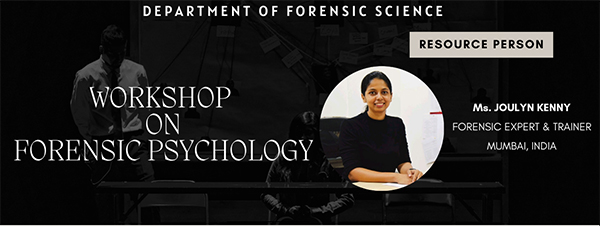
Two part workshop on Forensic Odontology
Date: 9th and 23rd October 2021
The Unit of Forensic Science at Kristu Jayanti College, Bangalore organized a two part workshop on Forensic Odontology for students and external participants on 9th and 23rd of October 2021.
The session was inaugurated on 9th October, 2021 by Dr. Muhammad Nasir Ahmed, a renowned forensic anthropologist and Fr. Dr. Augustine George, Principal, Kristu Jayanti College.
The Workshop had total of 6 session of which 3 sessions happened on each part of the workshop.
The resource persons for the workshop was Dr. Akhil S Shetty, oral pathologist and forensic Odontologist and Dr. Shrivya Saloni, Pedodontist and forensic Odontologist.
The topics covered during the workshop included – Dentition and dental anomalies, Identification of tooth using cases and radiographs (OPG & IOPA), Age estimation using teeth, report writing in forensic odontology, Rugae analysis and lip print analysis. The sessions were a good mix of both theory and demonstration which helped the participants understand the concepts in a simple manner. The resource persons also provided real-life case examples for the participants to learn from.
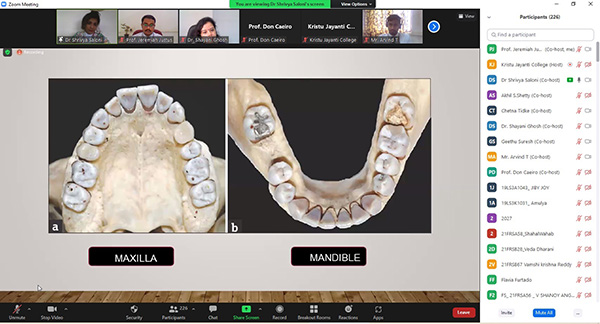
Workshop on Forensic Psychology
Date: 12th and 13th April 2022
An industrial visit was organised on 12th and 13th April 2022 for the IV semester Forensic Science UG students. The purpose was to provide hands-on training to techniques involved to Forensic Psychology. The firm M/s. Axxonet Pvt. Ltd., is a leading provider for service requirements to Forensic Psychology. The resource persons in the institute explained the concepts of the tools and techniques to the visiting students. Following the orientation, the students were provided with hands-on training on polygraph and Brian Electrical Oscillation System (BEOS) with student volunteers.
The questioning pattern, the techniques used and the problems one can face during the procedures were clearly explained. The students could perform the techniques on their own and learn the concepts in a practical fashion.


